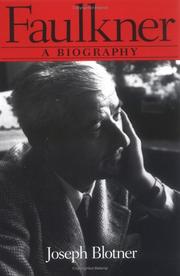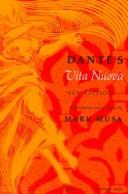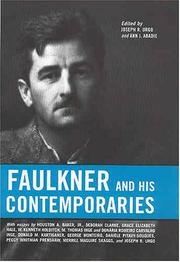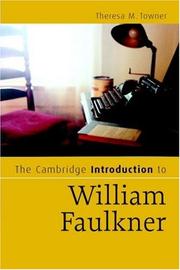| Listing 1 - 10 of 56 | << page >> |
Sort by
|

ISBN: 1282960881 1429460512 1578067324 1617031100 9786612960888 Year: 2005 Publisher: Jackson : University Press of Mississippi,
Abstract | Keywords | Export | Availability | Bookmark
 Loading...
Loading...Choose an application
- Reference Manager
- EndNote
- RefWorks (Direct export to RefWorks)
William Faulkner (1897-1962) remains the pre- eminent literary chronicler of the American South and a giant of American arts and letters. Creatively obsessed with problems of race, identity, power, politics, and family dynamics, he wrote novels, stories, and lectures that continue to shape our understanding of the region's promises and problems. His experiments and inventions in form and style have influenced generations of writers. Originally published in 1974 as a two-volume edition and extensively updated and condensed in a 1991 reissue, Joseph Blotner's Faulkner: A Biography remains the qu
Book
ISBN: 1527526879 Year: 2018 Publisher: Newcastle upon Tyne, UK : Cambridge Scholars Publishing,
Abstract | Keywords | Export | Availability | Bookmark
 Loading...
Loading...Choose an application
- Reference Manager
- EndNote
- RefWorks (Direct export to RefWorks)
Faulkner, William, --- Absalom, Absalom! (Faulkner, William) --- Southern States --- In literature.
Book
Year: 2001 Publisher: Montréal : Presses de l'Université de Montréal,
Abstract | Keywords | Export | Availability | Bookmark
 Loading...
Loading...Choose an application
- Reference Manager
- EndNote
- RefWorks (Direct export to RefWorks)
Lire Faulkner en français, est-ce encore lire Faulkner ? On peut en effet se demander si ses traducteurs se sont réellement préoccupés du langage si particulier du Sud des États-Unis que Faulkner, pourtant, avait rendu avec une fascinante maîtrise. Ce langage résisterait-il à toute traduction ? À partir de deux chapitres du roman The Hamlet, l'équipe de recherche dirigée par Annick Chapdelaine et Gillian Lane-Mercier propose une nouvelle façon de traduire Faulkner, en substituant au sociolecte du Sud américain le parler franco-québécois et en suivant les modulations si caractéristiques de l'écriture faulknérienne. Cette expérience de retraduction est encadrée par une réflexion portant sur l'œuvre de Faulkner, la pratique traductionnelle du groupe de recherche et le conflit des réceptions. Apport indiscutable à la traductologie, cet ouvrage saura aussi intéresser les lecteurs francophones de Faulkner curieux d'approfondir son langage et de le confronter à ses traductions.
Book
ISBN: 0190657286 0190274190 9780190274191 9780190274184 0190274182 9780190657284 Year: 2017 Publisher: New York, New York : Oxford University Press,
Abstract | Keywords | Export | Availability | Bookmark
 Loading...
Loading...Choose an application
- Reference Manager
- EndNote
- RefWorks (Direct export to RefWorks)

ISBN: 0253201624 0253011949 Year: 1973 Publisher: Bloomington (IN) : Indiana University Press,
Abstract | Keywords | Export | Availability | Bookmark
 Loading...
Loading...Choose an application
- Reference Manager
- EndNote
- RefWorks (Direct export to RefWorks)
In this new edition Musa views Dante's intention as one of cruel and comic commentary on the shallowness and self-pity of his protagonist, who only occasionally glimpses the true nature of love.""... the explication de texte which accompanies [Musa's] translation is instructively novel, always admirable.... This present work offers English readers a lengthy appraisal which should figure in future scholarly discussions.""
Dante Alighieri, --- FAULKNER (WILLIAM), 1897-1962 --- LIGHT IN AUGUST
Book
ISBN: 0820351148 9780820351148 9780820351131 082035113X Year: 2017 Publisher: Athens : Baltimore, Md. : The University of Georgia Press, Project MUSE,
Abstract | Keywords | Export | Availability | Bookmark
 Loading...
Loading...Choose an application
- Reference Manager
- EndNote
- RefWorks (Direct export to RefWorks)
During more than two decades (1932-1954), William Faulkner worked on approximately fifty screenplays for studios, including MGM, 20th Century-Fox, and Warner Bros., and was credited on such classic films as The Big Sleep and To Have and Have Not. The scripts that Faulkner wrote for film-and, later on, television-constitute an extensive and, until now, thoroughly underexplored archival source. Stefan Solomon not only analyzes the majority of these scripts but compares them to the novels and short stories Faulkner was writing at the same time. Solomon's aim is to reconcile two aspects of a career that were not as distinct as they first might seem: Faulkner as a screenwriter and Faulkner as a high modernist, Nobel Prize-winning author. Faulkner's Hollywood sojourns took place during a period roughly bounded by the publication of Light in August (1932) and A Fable (1954) and that also saw the publication of Absalom, Absalom!; Go Down, Moses; and Intruder in the Dust. As Solomon shows Faulkner attuning himself to the idiosyncrasies of the screenwriting process (a craft he never favored or admired), he offers insights into Faulkner's compositional practice, thematic preoccupations, and understanding of both classic cinema and the emerging medium of television. In the midst of this complex exchange of media and genres, much of Faulkner's fiction of the 1930s and 1940s was directly influenced by his protracted engagement with the film industry. Solomon helps us to see a corpus integrating two vastly different modes of writing and a restless author, sensitive to the different demands of each. Faulkner was never simply the southern novelist or the West Coast "hack writer" but always both at once. Solomon's study shows that Faulkner's screenplays are crucial in any consideration of his far more esteemed fiction-and that the two forms of writing are more porous and intertwined than the author himself would have us believe. Here is a major American writer seen in a remarkably new way.
Faulkner, William, --- Radio and television plays. --- Motion picture plays.
Book
ISBN: 0807157287 0807157279 9780807157282 9780807157275 Year: 2014 Publisher: Baton Rogue : Louisiana State University Press,
Abstract | Keywords | Export | Availability | Bookmark
 Loading...
Loading...Choose an application
- Reference Manager
- EndNote
- RefWorks (Direct export to RefWorks)
From the emerging field of disability studies, Taylor Hagood offers the first book-length consideration of impairment in William Faulkner's life and writing. Blending biography, textual analysis, and theory in an experimental style, Hagood explores in both form and content the constructs of normality and their power. Hagood brings to light little-known and rarely discussed ways in which Faulkner's personal and familial background were marked by disability and discusses the ways the writer incorporates disability into his fiction. He reevaluates Faulkner's so-called "idiots"-Benjy Compson, Ike Snopes, and others-as characters whose narratives both satisfy and shock the reader. Hagood also examines the roles that impairment and abnormality play in texts such as the stories "The Leg" and "The Kingdom of God" and the novels A Fable and Flags in the Dust. Highly original readings result, including new understandings of: the centrality of the visually impaired Pap in Sanctuary; the disability-centric social order based on interdependence in Pylon; and the disabled speech of Linda Snopes Kohl in The Mansion. Hagood argues that Faulkner's poetics are deeply invested in disability, both in promoting a disability-inclusive fictional world and in exposing and subverting the devaluation of disabled bodies and minds. Hagood draws on firsthand knowledge of his native of Ripley, Mississippi, the ancestral home of the Faulkners, to offer readers otherwise inaccessible contextual information. Moreover, by framing each section of his study within a different kind of discourse-newspaper style, biography, email, and advertisement-he uses the very structure of the book to underscore the questions of normalcy prevalent in disability studies. This rich and unconventional study offers insight into a Faulkner haunted by experiences of disablement and compelled to narrate them in his own writing.

ISBN: 1283193345 1423732022 1578066794 1604730587 9786613193346 Year: 2004 Publisher: Jackson : University Press of Mississippi,
Abstract | Keywords | Export | Availability | Bookmark
 Loading...
Loading...Choose an application
- Reference Manager
- EndNote
- RefWorks (Direct export to RefWorks)
Although he spent the bulk of his life in Oxford, Mississippi-far removed from the intellectual centers of modernism and the writers who created it-William Faulkner (1897-1962) proved to be one of the American novelists who most comprehensively grasped modernism. In his fiction he tested its tenets in the most startling and insightful ways. What, then, did such contemporaries as Ernest Hemingway, Eudora Welty, and Walker Evans think of his work? How did his times affect and accept what he wrote?. Faulkner and His Contemporaries explores the relationship between the Nobel laureate, ensconced in
American fiction --- Modernism (Literature) --- History and criticism --- Faulkner, William, --- Criticism and interpretation --- Contemporaries

ISBN: 9780521671552 9780521855464 9780511817045 9780511389559 0511389558 9780511391583 0511391587 9780511649790 0511649797 0511817045 9780511392320 0521855462 0521671558 1107176786 051139232X 051156855X 0511393636 Year: 2008 Publisher: Cambridge, UK ; New York : Cambridge University Press,
Abstract | Keywords | Export | Availability | Bookmark
 Loading...
Loading...Choose an application
- Reference Manager
- EndNote
- RefWorks (Direct export to RefWorks)
Nobel laureate William Faulkner is one of the most distinctive voices in American literature. Known for his opaque prose style and his evocative depictions of life in the American South, he is recognised as one of the most important authors of the twentieth century. This introductory book provides students and readers of Faulkner with a clear overview of the life and work of one of America's most prolific writers of fiction. His nineteen novels, including The Sound and the Fury, As I Lay Dying, Go Down, Moses and Absalom, Absalom! are discussed in detail, as are his major short stories and nonfiction. Focused on the works themselves, but also providing useful information about their critical reception, this introduction is an accessible guide to Faulkner's challenging and complex oeuvre.
Faulkner, William --- 820 "19" FAULKNER, WILLIAM --- 820 "19" FAULKNER, WILLIAM Engelse literatuur--20e eeuw. Periode 1900-1999--FAULKNER, WILLIAM --- Engelse literatuur--20e eeuw. Periode 1900-1999--FAULKNER, WILLIAM --- American literature. --- English literature --- Agrarians (Group of writers) --- Faulkner, William, --- Falkner, William, --- Fōkunā, Wiriamu, --- Фолкнер, Уильям, --- Folkner, Uilʹi︠a︡m, --- Fo-kʻo-na, --- Phōkner, Ouilliam, --- Fo-kʻo-na, Wei-lien, --- Fu-kʻo-na, --- Fu-kʻo-na, Wei-lien, --- Falkner, William Cuthbert, --- Pʻookʻŭnŏ, William, --- Foḳner, Ṿilyam, --- Pʻolkneri, Uiliam, --- K̲apākn̲ar, Villiyam, --- Fāknir, Vīlīyām, --- פוקנר --- פוקנר, וויליאם --- פוקנר, ויליאם, --- פוקנר, ןיליאם --- 福克纳威廉, --- Trueblood, Ernest V., --- Criticism and interpretation. --- Arts and Humanities --- Literature
Book
ISBN: 9789042027534 9789042027541 9042027541 9042027533 Year: 2009 Volume: 343 Publisher: Amsterdam ; New York, NY : Rodopi,
Abstract | Keywords | Export | Availability | Bookmark
 Loading...
Loading...Choose an application
- Reference Manager
- EndNote
- RefWorks (Direct export to RefWorks)
Le terme idiotie est créé au début du 19e siècle pour remplacer celui d’ idiotisme qui désignait à la fois l’absence de culture et la stupidité au sens médical. Pourtant l’origine grecque introduit une nuance : idios signifie ce qui est spécial, propre ou original. De là, dire que l’idiot, de Dostoïevski notamment, appartient à la catégorie des mélancoliques, êtres exceptionnels et artistes selon Aristote dans le Problème XXX, encourage une nouvelle définition du terme. Cet Éloge de l’idiotie observe pour la première fois de près le phénomène de l’idiotie romanesque en Occident à travers le 20e siècle. À la différence du 19e, le personnage idiot ne transmet pas seulement un thème mais bien une nouvelle façon de s’exprimer et d’écrire. Mettant en dialogue les termes idiotie et rhétorique , cette étude offre un examen méticuleux de quatre textes choisis et réunis de façon inédite: Nadja de Breton, Le Bruit et la Fureur de Faulkner, L’Innommable de Beckett et Marelle de Cortázar. Nadja, Benjy, l’Innommable et la Maga manifestent une ignorance et une singularité qui font d’eux ces idiots persécutés du fait de leur perception « anormale » de la réalité. Tout s’inverse lorsque leurs propos étranges se mêlent à la langue originale de chacun des livres. Proche de l’écrivain, l’idiot est à son tour métaphore de la rhétorique à l’œuvre, la figure idéale pour remettre en question toute prétendue intelligence ou raison au profit de l’éloge d’une forme de naïveté, une bienheureuse éthique de l’idiotie.
Faulkner, William --- Cortázar, Julio --- Beckett, Samuel --- Breton, André --- People with mental disabilities in literature. --- Holy fools in literature. --- Mentally handicapped in literature --- Breton, André, --- Faulkner, William, --- Beckett, Samuel, --- Cortázar, Julio.
| Listing 1 - 10 of 56 | << page >> |
Sort by
|

 Search
Search Feedback
Feedback About UniCat
About UniCat  Help
Help News
News